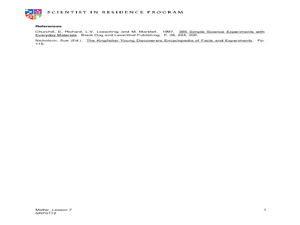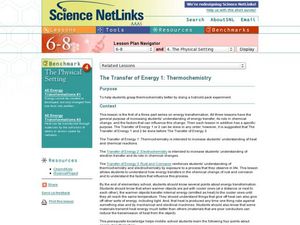Curated OER
Corrosion & Rust
Students examine how and when rust and corrosion occur. In this corrosion lesson students complete an experiment to see why metals rust.
Curated OER
The Transfer of Energy 3: Rust and Corrosion
Students research the type of chemical reaction that occurs when metal rusts. They conduct an experiment looking at the rate of corrosion in steel wool. This is lesson three in a three lesson unit on the transfer of energy.
Curated OER
Factors Which Affect Corrosion
Students investigate the factors which affect corrosion. For this corrosion lesson plan, students experiment with 2 nails, copper wire and magnesium ribbon placed in a petri dish of agar solution, potassium ferricyanate and an indicator....
Teach Engineering
How Can We Prevent the Corrosion Crisis?
Contemplate the causes of corrosion. An interesting lesson plan has learners first conduct an experiment where they place nails in different types of water. Based on the results, they consider how corrosion occurs and how engineers need...
Curated OER
Rusting-A Form of Oxidation
Students conduct an experiment to observe oxidation. For this chemistry lesson, students explain how rusting happens. They rank metals according to their conductivity.
Curated OER
Rusting-A Form of Oxidation
High schoolers observe the rusting process in the lab. In this chemistry lesson, students rank metals according to their conductivity. They give real world applications of this activity.
Curated OER
Oxidation And Corrosion
Students investigate the concepts of oxidation and corrosion. They identify different metals and forms of corrosion.
Curated OER
Oxidation And Corrosion
Students sort tarnished metals by type and experiment with different cleaning solutions and techniques to restore them to their natural color and shine.
Curated OER
Rusting: A Form of Oxidation
Students observe and record the corrosive nature of oxidation-reduction reactions, and determine the electro-chemical series of selected metals.
Curated OER
Chemical Changes to Matter
Students analyze the causes of corrosion. In this chemistry lesson, students investigate what is necessary to cause chemical changes in matter. Students discover the causes of rust and tooth decay.
Curated OER
Corrosion/Plating/Electrolysis
Students familiarize themselves with half cell reactions, potential circuits, etc. They participate in a lab that includes a worksheet that guides them through an inquiry pertaining to the content. They complete a series of questions...
Curated OER
The Transfer of Energy 2: Electrochemistry
Students study about electrochemistry by increasing their understanding of electron transfer and its role in chemical changes. They explain that energy appears in different forms. Heat energy is in the disorderly motion of molecules.
Curated OER
The Transfer of Energy 1: Thermochemistry
Budding chemists achieve a basic understanding of the role of heat in chemical reactions. An online worksheet gives learners instructions and questions to answer as they investigate the Chem4Kids website and perform a hands-on lab...
Curated OER
What Influences Reaction Rate?
Students study reaction rates, what determines how fast a reaction happens and how the chemical changes occur. In this reactions instructional activity students complete a lab where they use Alka-Seltzer to observe reaction rate and...
Curated OER
Water and Ice
Young scholars experiment with water and ice. In this states of matter lesson, students explore how water can change from a solid to a liquid and back again. They discuss and write about the results of the experiment in a science journal.
















